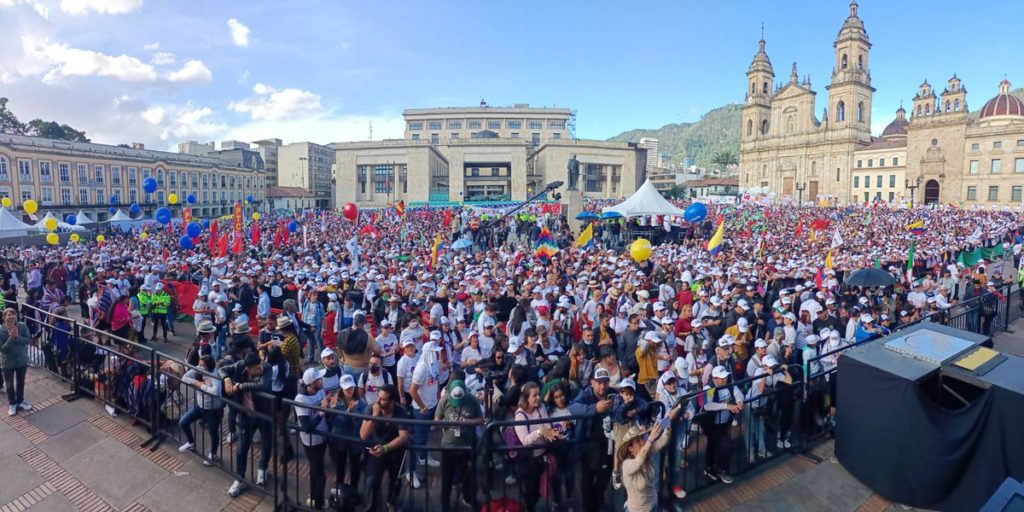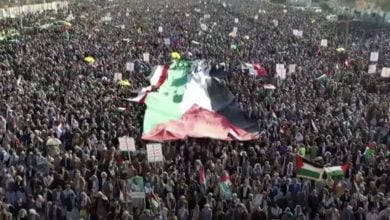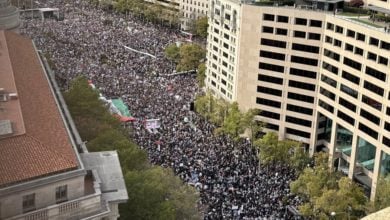The progressive ticket of Gustavo Petro and Francia Marquez of the Pacto Historico (Historic Pact) leftist alliance came in first in Sunday’s Colombian presidential election, capturing more than 40% of the vote. To the surprise of many and in contrast to most polls, Rodolfo Hernández, a right-wing millionaire running on an “anti-corruption” campaign came in second with just over 28% of the vote, beating out the his fellow right-winger Federico “Fico” Gutiérrez, the candidate favored by most in the ruling-class establishment, including outgoing president Ivan Duque.
Although Petro came in first, he did not get the required majority of the vote to avoid a second round of elections. He now has to face Hernández in a run-off election to decide the future of this country long plagued by war, inequality and imperialist intervention.

Most major Colombian and U.S. mainstream media outlets are calling the results of the first round a big surprise and a face-off between two “populist” candidates. Calling Rodolfo Hernández an anti-establishment candidate is the furthest thing from the truth. Hernández is popularly known as the Colombian Donald Trump and on more than one occasion has proclaimed his admiration for Hitler. The fact that he is calling himself an “anti-corruption” and “anti-establishment” crusader is ironic because he is currently under investigation and is set to face trial on July 21, accused of corruption while he was mayor of the city of Bucaramanga. As mayor, he enjoyed plenty of support and backing from the traditional far-right Uribistas, including its main representative, former Colombian president Alvaro Uribe, Duque’s mentor.
These headlines are the final act, exposing the strategy of the Colombian right of trying to masquerade Rodolfo Hernández as an anti-establishment candidate capable of defeating the massive progressive campaign of Gustavo Petro. For months now, they have elevated Fico as their official candidate while quietly propping up Hernández in recent months as their de-facto candidate, capable of scooping up votes from tepid conservative voters disillusioned with the last four years of the Duque administration.
Polls showed that two-thirds of the country wants some type of change from the existing administration’s failure to stop skyrocketing inflation, rampant corruption, the increasing dangerous threat of drug cartels, and the mismanaging of the COVID-19 public health crisis. Hernández’s posing as an “outsider” was the right wing’s smoke and mirrors strategy to disguise a new mutation of Uribismo, disguised as “change” and “anti-establishment.” The final curtain call was Fico’s immediate endorsement of the Hernández campaign immediately after the elections results in an attempt to consolidate their conservative base under one candidate.
This race is already shaping up to be Colombia’s most important and polarizing election of all time. On the one hand, Petro and Francia are offering a new path for millions of Colombians yearning for change. They ran on a progressive platform that includes increasing the budget for education, a universal public health system, and many other much-needed social reforms by taxing the rich. They plan to normalize the relationship with Venezuela, uphold the 2016 Havana peace accords completely dismantled by Duque, and challenge illegal armed groups and right-wing paramilitary organizations that are allowed to operate with impunity and spread terror and violence against the Colombian people.
On the other hand is Hernández, who is nothing but the continuation of the decades of violence and state sanctioned terror of his right-wing predecessors. He is a wild card who constantly changes his position on decriminalizing abortion, upholding the peace accords and normalizing relations with Venezuela — while at the same time proposing a traditional conservative fiscal policy to reduce spending by eliminating much needed programs and public institutions like the High Counselor’s Office for Women’s Equity. On one occasion he made extremely sexist and xenophobic comments by referring to migrant Venezuelan women living in Colombia as “factories of children.”
The battle ahead
While Petro leads in polls, it is going to be a difficult second round run-off election as the looming violence and intimidation his campaign has already seen will most likely intensify. On a promising note, Petro’s 12-point lead against Hernández in the first round is a significant improvement from his 2018 presidential bid. Petro received more votes in the first round of this year’s election than in the second round of the previous election.
Colombia’s right-wing sectors fear the possible historic victory of the progressive ticket of Gustavo Petro and Francia Marquez, leading to a dangerous political environment. Their possible historic triumph threatens to break the decades-long dominance of these conservative and extreme right sectors of the country.
In his first round victory speech on Sunday, Petro took the opportunity to launch a direct criticism of his second round opponent, saying, “you do not fight corruption with Tik Tok videos,” referring to how Hernández has mainly used social media to popularize his campaign and did not even attend the last national presidential debates. Petro added, “you fight corruption by risking your life. We have risked our lives many times to fight the corruption regime.”
In his speech, Petro was referring to the multiple serious death threats his campaign has received since they began. In one of the closing campaign rallies prior to Sunday’s election, vice-presidential candidate Francia Marquez had a laser pointed at her head in the middle of the stage while giving a speech to thousands of supporters in a plaza in the city of Bogota, Colombia’s capital. The scene looks like something out of a Hollywood action movie. Videos on social media captured the moment when her bodyguards immediately covered her with bulletproof shields to prevent a possible attack on her life.
Defiant as ever, the candidate continued to agitate to her listeners as she was lowered from the stage shouting, “You will not pass, we will liberate our people.” This was the fourth death threat since March.
Francia Marquez is an Afro-Colombian lawyer and activist. If they were to win, she would become the country’s first Black vice president. Marquez is no stranger to death threats. In 2016, she was forced to flee her home after facing violent threats by illegal armed groups hired by wealthy mining companies in her naitive Valle del Cauca. Colombia tops the list every year as the most dangerous country in the world to be an environmental and human rights activist. This year alone, close to 70 activists have been killed in 2022. Both Petro and Marquez on several occasions have even had to suspend and cancel campaign events due to suspicions of possible attempts on their lives.
Petro, former mayor of Bogota and former member of the guerrilla group Movimiento 19 de Abril (M-19), was asked in an interview with a French TV channel if he was afraid of being assassinated in the middle of the campaign, to which he answered, “The ghost of death accompanies us … When I mingle in the crowd, when I am on a platform and there is a full square, that anywhere someone could shoot.” This kind of question to a presidential candidate or the image of Marquez being covered by bulletproof shields may be shocking, but in Colombia these threats against progressive candidates are real and have stained the country with a long and bloody history of assassinations of political figures.
Assassinations and right-wing terror
The death threats against Gustavo Petro and Francia Marquez carry historical weight in Colombia and cannot be ignored or taken lightly. The history of assassination in Colombia begins with the assassination of the progressive presidential candidate of the Liberal Party, Jorge Eliecer Gaitan, in 1948. This started the period known as “La Violencia” for two decades, unleashing thousands of deaths in the country.
In another moment, the presidential candidate of the leftist Patriotic Union party, Jaime Pardo Leal, was assassinated in 1987. Only three years later, his replacement, Senator Bernardo Jaramillo, was assassinated in 1990. Another high-profile killing was that of the leader of the “new liberalism” Luis Carlos Galán, who was assassinated in 1989 after promising to confront Pablo Escobar and drug trafficking if elected president. And to finish this long and bloody list, there is the assassination of Carlos Pizzaro, former leader of the M-19 in 1990.
Petro’s possible victory makes the Colombian ruling class feel in danger of losing — or even just having diminished — the political power and privilege they wield.
Last February, Washington’s Under Secretary of State for Political Affairs Victoria Nuland visited Colombia for high-level security talks, during which she denounced “foreign actors” that are trying to subvert the upcoming elections. In addition, she pledged that the U.S. military and intelligence apparatus would work together with their Colombian counterparts to ensure “free and fair elections.” These were the words of Victoria Nuland, key architect of the 2014 coup in Ukraine. Her comments in Colombia should be taken as a threat that endangers the democratic will of the people, especially if Petro and Marquez emerge victorious.
A critical election
Colombia is known as the military garrison of the United States in Latin America, whose government attempts to ensure that countries in the region conform to Washington’s dictates. Colombia is one of the biggest recipients of aid from the U.S. government under the notoriously deadly “Plan Colombia” signed by Bill Clinton and its successor “Peace Colombia” plan under Obama. Since 2000, Colombia has received close to $12 billion in U.S. “security” aid, under the pretext of fighting the war on drugs.
Laura Capote, a member of the Colombian organization Marcha Patriotica and the secretariat of the regional alliance ALBA Movimientos, commented to Liberation News that these elections are “a fundamental election in the history of our country.” She also added that the possible victory of the duo of Petro and Marquez would mean “the possibility of finally turning the page of more than 20 years of a political project that has been the project of Uribismo, a project that has strengthened the policies of violence and exclusion in our country and deepened inequality and the violation of human rights.”
The Uribismo project Capote refers to was launched by the former president and main representative of Colombia’s extreme right, Alvaro Uribe. Uribismo has been responsible for a wave of bloodshed that has plagued the country for more than two decades despite a signed peace agreement. It represents an extreme right-wing political current.
Uribismo enjoys a close relationship with paramilitary death squads that carry out a reign of terror by routinely assassinating leaders of social organizations including Afro-Colombian, Indigenous, peasant and union movements. Their political supporters are implicated in an immense number of scandals and human rights violations, including the “false positives” scandals, in which more than 6,400 civilians were killed by the military and then disguised as guerrilla fighters to justify their murders. Last year, eight children were killed in Caqueta and passed off as enemy combatants.
The victory of Petro and Marquez would be an important step forward for Colombia. It would open up the possibility of leaving behind more than 60 years of one of the bloodiest conflicts in the world, led by right-wing governments backed by the United States that are responsible for the militarization and repression of the country by the army, police and paramilitaries.
One of Petro’s main campaign promises is to uphold the peace accords signed in 2016. These are a series of measures that ended the more than 60-year armed conflict between the Colombian government and FARC guerrillas. Three main parts of the agreement were: productive projects for the civilian reintegration of demobilized combatants who had been fighting for decades so that they could have a job and a livelihood, institutional mechanisms and tribunals to be able to judge the crimes committed during the conflict, and security guarantees for former guerrilla combatants. Each and every aspect of these peace accords has been undermined, defunded and violated by outgoing President Duque.
Over 1,000 social leaders and demobilized combatants have been assassinated since the signing of the peace accords, with most of these murders occurring under President Duque’s administration. Uribismo has been in practice a war against poor and working people with high economic and social consequences. The authors of this article note their families are also victims of Uribismo policies that forced them along with millions of other Colombians to leave our homeland in search of work and the opportunity for a better life and peace in the United States and Europe.
The second round of the election between Petro and Hernández will be held on June 19. The preceding weeks will see an intense fight against the right wing in its new “anti-establishment” disguise. And if Petro and Marquez prevail, the people’s movements of Colombia will be faced with a new stage in the struggle with new dilemmas and challenges. The country stands on the cusp of a new era in its politics.






